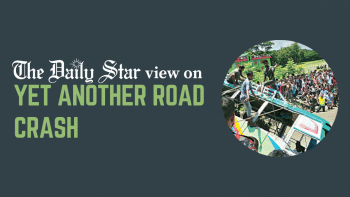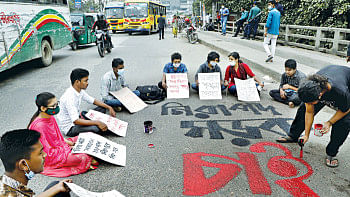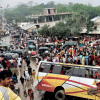Don’t let road safety be held hostage

The Road Transport Act (RTA) was passed five years ago, in a somewhat hurried manner following a widespread protest led by school students. The law, as the government had promised back then, was aimed at safeguarding the lives of passengers, drivers and pedestrians on the road. Five years later, our roads are not any safer. In fact, according to road safety advocates, roads in Bangladesh – particularly in Dhaka – have become increasingly dangerous, especially for pedestrians.
This hardly comes as a surprise, seeing as the road safety law is yet to be fully implemented. Unlike the Digital Security Act (DSA), which was passed around the same time as RTA and was implemented right away, the government has faced numerous hurdles to put the latter into effect. As passenger welfare advocates have pointed out time and again, transport leaders, most of whom either have strong ruling party connections or are part of the ruling regime themselves, have heavily influenced the government's decisions in their favour. Sadly, those decisions have often proven to be detrimental for the people.
Take, for example, the matter of unfit vehicles. The state-owned Bangladesh Road Transport Authority (BRTA), on May 17, issued an order to cap the economic life of buses and trucks, aiming to reduce road crashes as well as pollution. That decision was put on hold by the Road Transport and Highways Division (RTHD) less than four months later, when they caved in under the pressure of transport associations. This has been the case for almost all road safety-related decisions. This is why, despite passing the law in September 2018, the government was only able to finalise its rules in December 2022.
By failing to withstand the influence of transport owners and leaders, our government has failed to ensure safety for us on the road. According to the data collected by Bangladesh Jatri Kalyan Samity, between 2015 and 2022, more than 21 people have been killed and 39 more injured in road crashes every day on average. Dhaka has been found to be the most unsafe place in the country, which is ironic, seeing as it is also the slowest city in the world, traffic-wise.
It's high time our government stopped caving in to the vested interest groups in our transport sector, who throw tantrums whenever an official decision to improve road safety goes against their favour. The government must remember that it is mandated to serve the people, not the transport owners and associations.


 For all latest news, follow The Daily Star's Google News channel.
For all latest news, follow The Daily Star's Google News channel. 









Comments